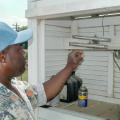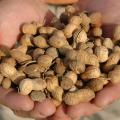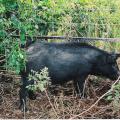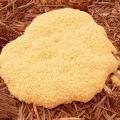Feature Story from 2007
MISSISSIPPI STATE -- A new reality show will help Mississippi's 3- and 4-year-old children prepare for their first day of school.
Mississippi State University's Extension Service is tapping into the latest media trend by providing a unique glimpse into an accredited classroom and training child-care providers to prepare preschoolers for kindergarten. They are demonstrating that some reality shows are not only entertaining, they also can be educational.
MISSISSIPPI STATE -- Camping often brings people closer to nature, but Mississippi State University is also offering the opportunity to learn about wildlife, fisheries and the great outdoors to parents, teachers and children as young as 10.
Two camps will be offered this summer: June 3-7 and July 8-12. The cost for each camp is $225 per person and includes on-campus lodging, meals, field trip transportation and a camp T-shirt. During the week, participants will eat a wildlife meal after receiving tips on cooking game.
MISSISSIPPI STATE -- Mississippi's 2006 timber harvest value declined almost 17 percent from the previous year, and industry watchers do not expect much improvement in 2007.
Glenn Hughes, a forestry professor with Mississippi State University's Extension Service, said a significant amount of Hurricane Katrina-damaged timber remains in storage -- wet-decked -- in lumber yards awaiting use.
MISSISSIPPI STATE -- Each morning Carl Blair, like many people, checks the weather, but his interest in the weather is part of a tradition that goes back 125 years.
Blair is an equipment operator for the Mississippi Agricultural and Forestry Experiment Station at Mississippi State University and his duties include recording data collected by National Weather Service equipment located on campus.
By Courtney Coufal
MSU Ag Communications
MISSISSIPPI STATE -- Efforts to take university-level training to every corner of the state have earned the Mississippi State University Extension Service two national awards.
The American Distance Education Consortium and the U.S. Distance Learning Association both recognized the Extension Service for its outstanding and comprehensive distance education program. The program provides Mississippians with educational instruction when physical distance separates students and instructors.
MISSISSIPPI STATE -- Many Mississippi teenagers become mothers long before they are ready to celebrate Mother's Day, leaving many of them with a lifetime of struggle.
Mississippi has the highest teen birthrate of any state in the nation, according to the National Campaign to Prevent Teen Pregnancy Web site, http://www.teenpregnancy.org. In 2003, the last year for which data is available, 65 girls per 1,000 age 15-19 had children, for a total of 6,625 babies born to teenagers.
MISSISSIPPI STATE -- A Mississippi State University Extension forestry specialist is the Forest Landowners Association’s Extension Forester of the Year.
The organization, which is comprised of forest landowners in 17 southern states, selected MSU Extension professor Timothy Traugott for the 2007 honor.
During 22 years as an MSU Extension forestry specialist, Traugott has conducted almost 300 workshops and short courses for more than 8,000 Mississippi landowners.
MISSISSIPPI STATE -- Mississippi's peanut growers have been planting ahead of the five-year average, but fields need rain to keep them on track.
By the May 6 crop report issued by the National Agricultural Statistics Service in Mississippi, farmers had planted 12 percent of the state's peanut crop. The five-year average for that date is 5 percent. Agronomists with Mississippi State University's Extension Service said the ideal planting time typically concludes around June 1, but peanuts can be planted later if necessary.
By Andrea Cooper
MSU College of Forest Resources
MISSISSIPPI STATE -- Feral hogs have perhaps the worst reputation of any wild game animal in the nation, and Mississippi State University researchers hope to gain the upper hand by studying their habitat and populations.
While hunters enjoy pursuing these elusive and dangerous animals, most landowners view wild hogs as nuisances because of their extremely destructive foraging habits.
MISSISSIPPI STATE -- Mississippi's cotton fields are benefiting from timely rains and are off to one of their best starts in recent years, but the crop has significantly fewer acres in 2007.
By the middle of May, more than 70 percent of the state's cotton was planted and 35 percent was emerged, according to a report by the National Agricultural Statistics Service in Mississippi.
MISSISSIPPI STATE -- Chris Bell of Newton County is the latest Mississippian with a disability to benefit from a program designed to maintain agricultural lifestyles despite a life-altering event.
Bell, 57, of Lawrence, is a cattle farmer who uses a wheelchair, the result of a 2005 medical procedure that went wrong. He lives alone and with help from his son and friends, runs a 100-head cow/calf operation, raises hay, produces honey, and raises and trains border collies.
MISSISSIPPI STATE -- Area beekeepers can expand their knowledge of the bee business at a beekeeping short course scheduled for June 12 from 8:30 a.m. to 4 p.m. on the Mississippi State University campus.
Workshop topics include fall and winter management, parasitic mites, diseases and pests of honey bees, area honey plants and honey flows, and swarm management. Bee enthusiasts also will learn about starting and developing productive colonies, re-queening colonies, dividing colonies, and sampling for mites and diseases.
MISSISSIPPI STATE -- Mississippi soybeans had one of the most uneven starts they have had in years, but one constant is the need for rain.
Dan Poston, northwest district soybean specialist with the Mississippi State University Extension Service, said Delta soybeans looked pretty good in late May, but time was running out for fields to get a rain.
MISSISSIPPI STATE -- One of the best things about Mississippi summers is the delicious food provided by fresh garden vegetables, a goodness people can enjoy year-round with preserved vegetables.
Brent Fountain, human nutrition specialist with the Mississippi State University Extension Service, said fresh may be best, but it isn't the only option. Freezing or canning fruits and vegetables will extend the time in which garden produce can be eaten.
MISSISSIPPI STATE -- Mississippi's youth have seen their share of tornado and hurricane damage, and they know how much donations from others can help.
Mississippi 4-H members celebrated their organization's 100th anniversary by collecting money during the state 4-H Congress the last week of May to contribute to teachers in Enterprise, Ala., the site of a deadly March tornado that killed eight high school students.
MISSISSIPPI STATE -- Mississippi dairy farmers have a reason to celebrate dairy month, but don't expect a big party.
Bill Herndon, dairy economics specialist with the Mississippi State University Extension Service, said farm-level milk prices have reached what he described as a “magical $20-per-hundredweight level.” Unfortunately, feed, fuel, energy and fertilizer costs all have increased at about the same rate as milk prices.
MISSISSIPPI STATE -- Mississippi, Arkansas and Louisiana pecan growers can learn more about production and marketing issues at a June 21-22 convention and trade show in Shreveport, La.
Pecan grower associations from each of the three states are sponsoring the event at the Clarion Hotel. Registration begins at noon on June 21 and costs $35.
MISSISSIPPI STATE -- Mississippi may not be far behind the Georgia and Florida wildfires if people are not careful during hot, dry conditions.
Charles Burkhardt manages Mississippi State University's timberlands located throughout the state.
MISSISSIPPI STATE -- Laramy Cummings was recently named the first recipient of a new scholarship named in honor of a long-time supporter of equine activities in Oktibbeha County.
MISSISSIPPI STATE -- Many gardeners across the state are shocked by sprawling, bright orange masses that appear quickly in gardens, but this scary looking fungus is quite harmless.
Clarissa Balbalian, plant diagnostic lab manager with the Mississippi State University Extension Service, said the fungus is a slime mold that feeds on decaying woody material.
“It doesn't hurt plants or people,” Balbalian said. “Slime molds live on fungi, bacteria and other microscopic creatures that decay organic material.”
Pages
Feature Story Archive
- 2024 (120)
- 2023 (114)
- 2022 (116)
- 2021 (105)
- 2020 (141)
- 2019 (127)
- 2018 (141)
- 2017 (199)
- 2016 (242)
- 2015 (320)
- 2014 (358)
- 2013 (374)
- 2012 (344)
- 2011 (248)
- 2010 (239)
- 2009 (229)
- 2008 (189)
- 2007 (210)
- 2006 (199)
- 2005 (224)
- 2004 (218)
- 2003 (228)
- 2002 (177)
- 2001 (184)
- 2000 (190)
- 1999 (182)
- 1998 (179)
- 1997 (188)
- 1996 (58)
- 1995 (36)









